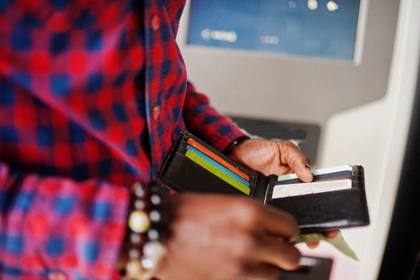What is a credit card?
A credit card is a payment tool that allows you to borrow funds from a lender instead of using your own money. Your credit card will have a credit limit, as well as a set of fees and conditions, which are important to understand before using the card.
Credit cards are a form of revolving credit, which means you can spend money, repay it, and then spend again. It also means you have control over your payments – you can pay more one month and less another. Bear in mind that if you don’t pay your balance in full by the payment due date, you will be charged interest.
This is different from non-revolving credit, like a loan, where you borrow a set amount and typically repay a fixed amount each month.
Why understanding credit cards is important
Understanding how credit cards work is crucial because they offer both benefits and risks. Used responsibly, credit cards can help you build a strong credit history, earn rewards, and manage unexpected expenses. However, if misused, they can lead to debt and negatively impact your credit score.
Key components of a credit card
-
Credit limit: The maximum amount you can borrow at any one time.
-
Interest rate (APR): The annual percentage rate is the cost of borrowing on your card. If you don’t pay your balance in full each month, interest will be charged on the remaining amount.
-
Minimum payment: The smallest amount you must pay each month to keep your account in good standing.
-
Billing cycle: The period during which your transactions are recorded. At the end of this cycle, you’ll receive a statement summarising your spending.
-
Grace period: The time between the end of the billing cycle and the due date. If you pay your balance in full during this period, you won’t be charged interest.
What can a credit card be used for?
A credit card can be used to:
-
spread the cost of a large purchase
-
offer protection on some purchases
-
earn rewards on your spending
However, these depend on the type of credit card you get and how you use it.
Different types of credit cards
Some of the most popular types of credit card include:
Standard credit cards
These are the most common types of credit cards used for everyday purchases. They don’t offer any special rewards or benefits, but they can be a great tool for managing cash flow.
Bad credit credit cards
These are designed for individuals with a low or poor credit score. Bad credit credit cards typically have lower credit limits and higher interest rates, but they offer an opportunity to rebuild your credit by making regular, on-time payments.
Credit builder credit cards
These credit cards are aimed at people who are new to credit or looking to improve their credit history. By using a credit builder card responsibly—paying your bills on time and keeping your balance low—you can gradually build or improve your credit score over time.
Balance transfer credit cards
These allow you to move existing credit card debt from one or more accounts to a new card, often at a lower interest rate.
Balance transfer cards typically offer an introductory period with low or 0% interest on the transferred balance, making it easier to pay off debt faster by reducing interest costs.
However, a fee is usually charged for the transfer, and the interest rate increases once the introductory period ends.
0% purchase credit cards
These allow you to make purchases without paying interest for a set period, typically several months. During this promotional period, any new purchases won't accrue interest, making it easier to pay off big expenses over time without extra costs.
0% money transfer credit cards
These let you transfer cash from your credit card directly into your bank account, with no interest charged for a specified period. This can be useful for paying off overdrafts or loans, as it gives you time to repay the balance without incurring interest.
How do credit cards affect my credit score?
Your credit score is a number that represents your creditworthiness. Credit cards can have a significant impact on this score. Key factors include:
-
Payment history. Paying your bills on time helps build a positive credit history.
-
Credit utilisation. This is the ratio of your credit card balance to your credit limit, e.g. how much of your credit limit you actually use. Keeping your balance low, below 25-30% of your limit, is good for your score.
Tips for using your credit card responsibly
-
Pay on time and always pay at least the minimum payment amount. By paying by the due date, you can avoid late fees and damage to your credit score.
-
Keep balances low. Try not to use more than 30% of your credit limit.
-
Avoid opening too many accounts at once. Each credit application can temporarily lower your score, so apply for new cards only when necessary.
Pros and cons of credit cards
|
Pros |
Cons |
|
Convenience: Credit cards are accepted almost everywhere and make it easy to pay for things without carrying cash. |
Interest charges: If you don’t pay your balance in full, you’ll usually be charged interest, which can add up quickly. |
|
Rewards: Many offer rewards, such as cashback or travel points, for using them. |
Potential for debt: It’s easy to overspend with a credit card, leading to debt that can be difficult to pay off. |
|
Building credit: Using a credit card responsibly can help you build a strong credit history, which is important for getting loans or mortgages in the future. |
Impact on credit score: Missing payments or carrying a high balance can hurt your credit score. |
|
Purchase Protection: Section 75 means that you have an extra layer of protection on all credit card purchases between £100 - £30,000. |
Fees: Fees include cash withdrawal fees, foreign transaction fees and late fees. |
What are the costs involved?
You don’t typically have to pay to get a credit card. However, the fees you might have to pay are set out in the terms and conditions. For example, if you don’t pay your bill, pay late or go over your limit, you should expect to pay extra charges.
Some cards come with an annual fee too, these tend to be cards with benefits and rewards such as air miles.
How to get a credit card
In order to get a credit card, you’ll need to complete an application with the lender. You'll typically need to provide information such as:
-
your age
-
your income
-
your occupation
-
if you have any dependants
If you’re thinking of applying for a credit card, then it’s a good idea to check your credit report first for any inaccuracies. For most cards, you can use an eligibility checker to see if you’re likely to be approved for a product before you apply. This will show you whether you can apply with confidence, without affecting your credit score.
If you have a poor credit history or no credit history, there are some quick things you can do to boost your score and improve it for the future.
Ocean Credit Card
See if it's a YES before you apply
- Up to £1,500 credit limit
- Checking won't affect your credit score
- Get a response in 60 seconds
39.9% APR
Representative (variable)
Intelligent Lending Ltd (credit broker). Capital One is the exclusive lender.

Disclaimer: We make every effort to ensure content is correct when published. Information on this website doesn't constitute financial advice, and we aren't responsible for the content of any external sites.






